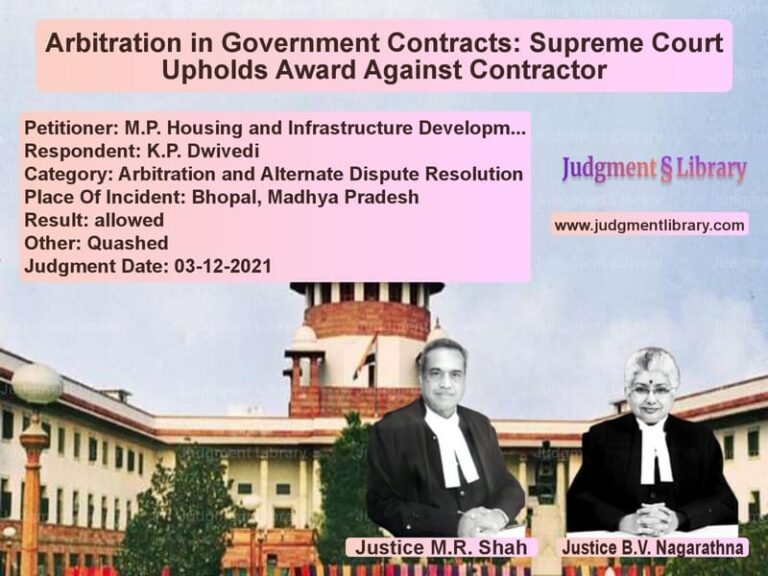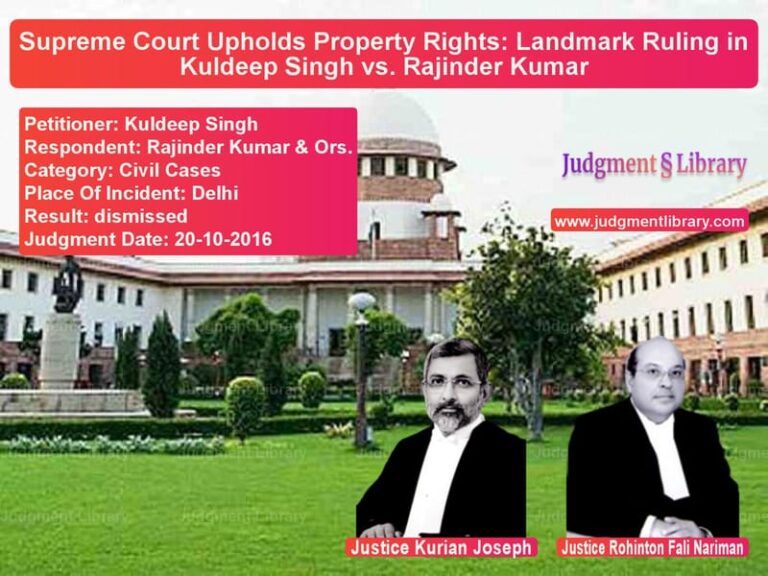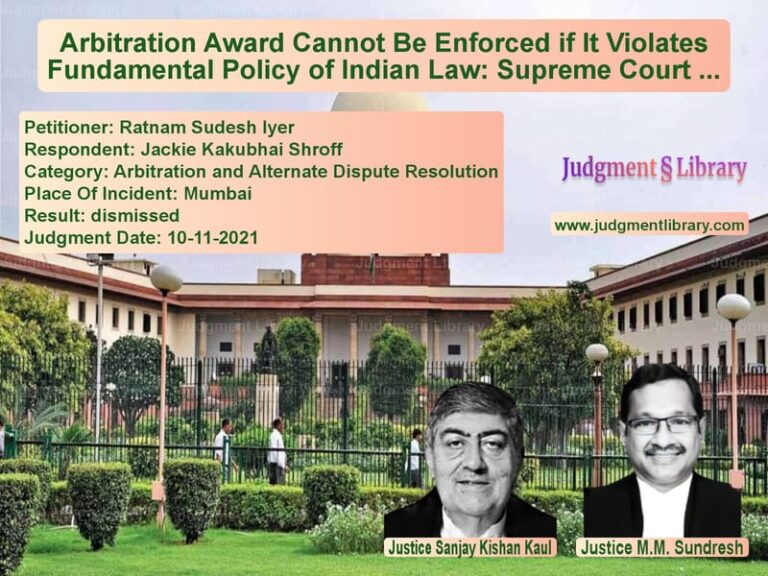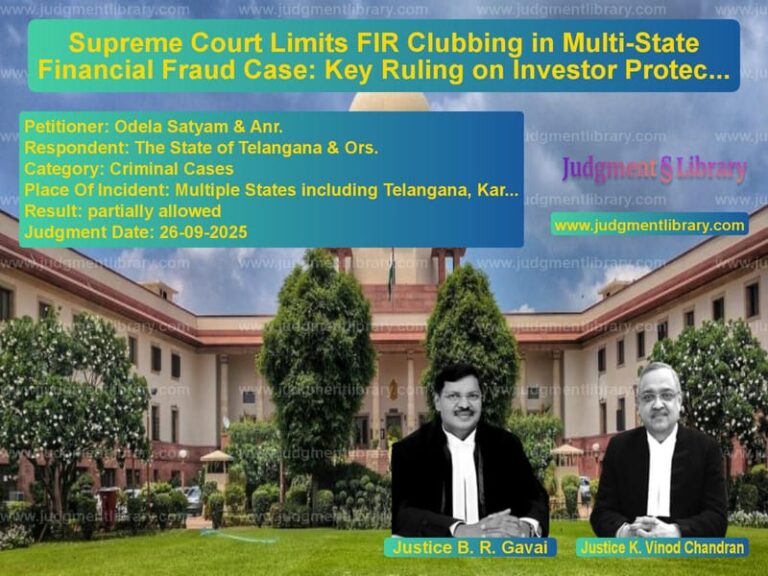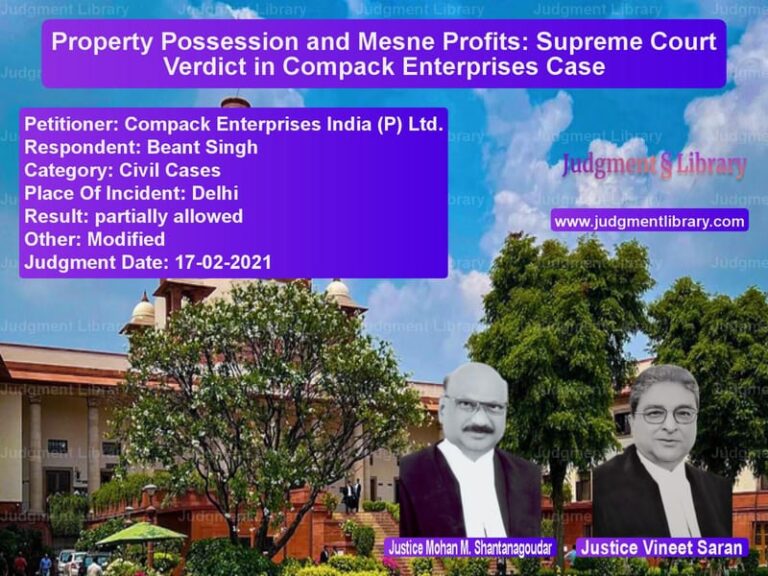Reservation and Validity of Caste Certificates: Supreme Court’s Ruling on Termination of Employment
The Supreme Court’s ruling in Jayashree vs. The Director Collegiate Education addresses a significant issue concerning caste-based reservations in public employment. This case examines the legal implications of obtaining employment under a reserved category when an individual’s caste certificate is later found invalid. The judgment provides clarity on the scope of voidable appointments, recovery of financial benefits, and the application of principles of natural justice.
Background of the Case
The appellant, Jayashree, was appointed under the Scheduled Tribe (ST) reservation category in Karnataka. However, upon verification, authorities determined that she did not belong to the Scheduled Tribe community under which she had secured her appointment. As a result, her services were terminated, and she was directed to repay the salary and benefits received during her tenure.
Jayashree challenged this decision before the Karnataka Administrative Tribunal and subsequently in the High Court, both of which upheld the termination. She then appealed to the Supreme Court, contending that her appointment was voidable, not void, and that her termination without prior notice violated principles of natural justice.
Petitioner’s Arguments
- The appointment was not void but voidable under Section 4(4) of the Karnataka Scheduled Castes, Scheduled Tribes, and Other Backward Classes (Reservation of Appointments, etc.) Act, 1990. Therefore, her termination without due process was unlawful.
- No fraudulent intent was involved in securing her employment as she genuinely believed she belonged to the Scheduled Tribe category.
- The termination order violated the principles of natural justice as she was not given an opportunity to present her case.
- Rule 7B of the Karnataka Scheduled Castes, Scheduled Tribes, and Other Backward Classes (Reservation of Appointment, etc.) Rules, 1992, does not allow for the recovery of salaries and allowances, only for scholarships and financial benefits.
- The Supreme Court should exercise its powers under Article 142 of the Constitution to prevent recovery of the salary earned during her service.
Respondent’s Arguments
- The appellant was given ample opportunities to prove her caste validity, but she failed to establish her claim.
- The government had a duty to terminate individuals who obtained appointments under false caste claims to ensure rightful beneficiaries receive reservations.
- The Karnataka law states that appointments made in violation of reservation norms are voidable, allowing the government to act upon verification.
- The High Court correctly dismissed her petition, and recovery of benefits was justified under Rule 7B.
Supreme Court’s Key Observations
1. Nature of Voidable Appointments
The Supreme Court analyzed whether the appellant’s appointment was void or voidable. It held:
“The expression ‘voidable’ in the context of the Act and the object of the Act and, more importantly, the constitutional value of equality would mean that appointments to the reserved vacancies are meant only for those who are deserving by being members of the said community alone.”
The Court emphasized that such appointments cannot be sustained once found unlawful. Allowing an individual to continue service despite being ineligible would amount to a violation of the rights of genuine candidates belonging to the reserved category.
2. Violation of Natural Justice
The appellant argued that her termination was illegal because she was not given an opportunity to present her case. However, the Supreme Court found that the verification process had already been completed and her caste claim had been rejected through a due process. The Court held:
“An exception to the principle of natural justice exists where providing an opportunity would be a futile exercise.”
Since the appellant’s caste claim had attained finality, the employer had no discretion but to terminate her employment.
3. Recovery of Salary and Benefits
The Court examined whether salaries earned during employment could be recovered under Rule 7B of the 1992 Rules. It ruled:
“The words ‘financial benefits’ and ‘allowances’ are widely worded and must be interpreted to include salaries, given the purpose of the Act to deter individuals from making false claims.”
However, considering the specific circumstances, the Supreme Court invoked its powers under Article 142 of the Constitution and held that the recovery of salaries and allowances should not be enforced.
Final Verdict
The Supreme Court upheld the termination of the appellant but directed that no recovery of salaries or financial benefits should be made. The key conclusions were:
- The appellant’s appointment was voidable and was rightfully terminated after verification.
- The principles of natural justice were not violated as giving an opportunity would have been futile.
- Recovery of salaries could have been justified under the law, but in the interest of justice, the Court exercised its discretion to prevent recovery.
Impact of the Judgment
This ruling sets an important precedent regarding the validity of caste-based appointments in public employment. It reinforces the need for rigorous verification and ensures that reserved category benefits are granted only to rightful beneficiaries.
Moreover, the judgment clarifies that appointments obtained under incorrect caste claims, even if made in good faith, cannot be sustained. However, in cases where individuals have worked and earned salaries, courts may consider equitable relief under exceptional circumstances.
Petitioner Name: Jayashree.Respondent Name: The Director Collegiate Education.Judgment By: Justice K.M. Joseph, Justice Hrishikesh Roy.Place Of Incident: Karnataka.Judgment Date: 22-02-2022.
Don’t miss out on the full details! Download the complete judgment in PDF format below and gain valuable insights instantly!
Download Judgment: jayashree-vs-the-director-collegi-supreme-court-of-india-judgment-dated-22-02-2022.pdf
Directly Download Judgment: Directly download this Judgment
See all petitions in Employment Disputes
See all petitions in Termination Cases
See all petitions in Public Sector Employees
See all petitions in Judgment by K.M. Joseph
See all petitions in Judgment by Hrishikesh Roy
See all petitions in dismissed
See all petitions in supreme court of India judgments February 2022
See all petitions in 2022 judgments
See all posts in Service Matters Category
See all allowed petitions in Service Matters Category
See all Dismissed petitions in Service Matters Category
See all partially allowed petitions in Service Matters Category


